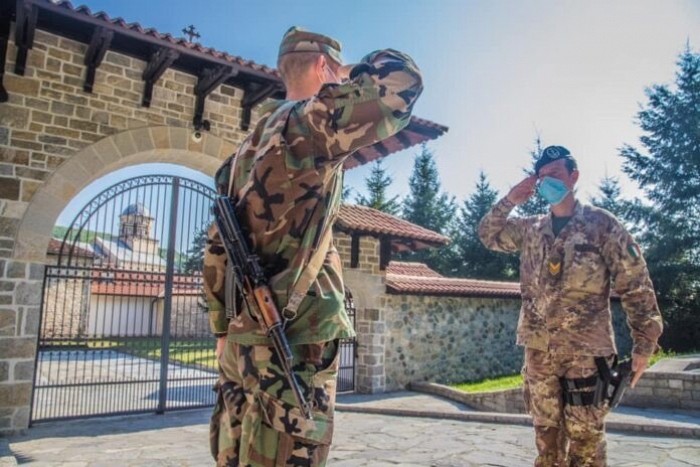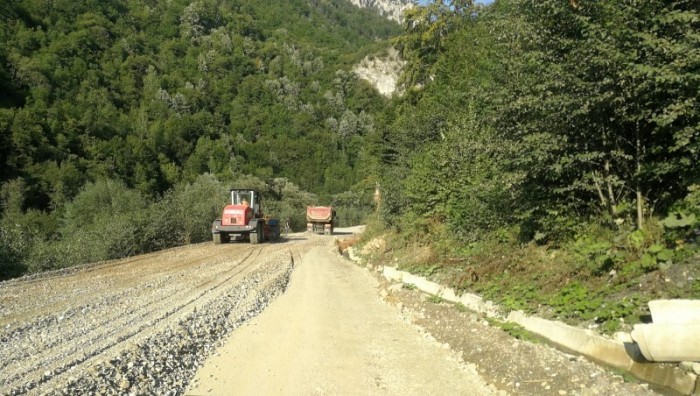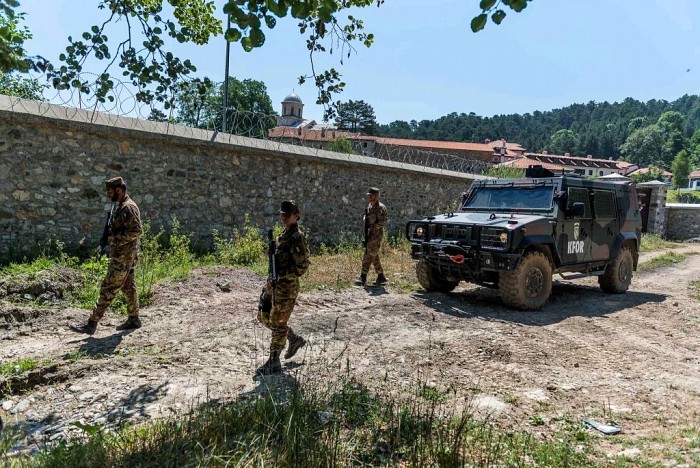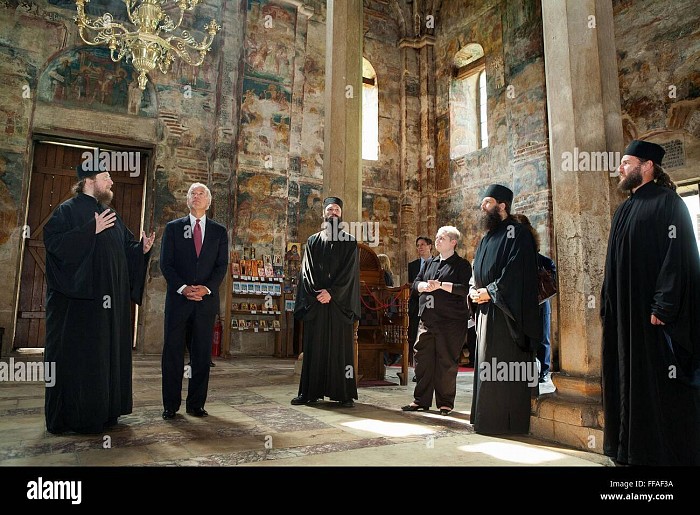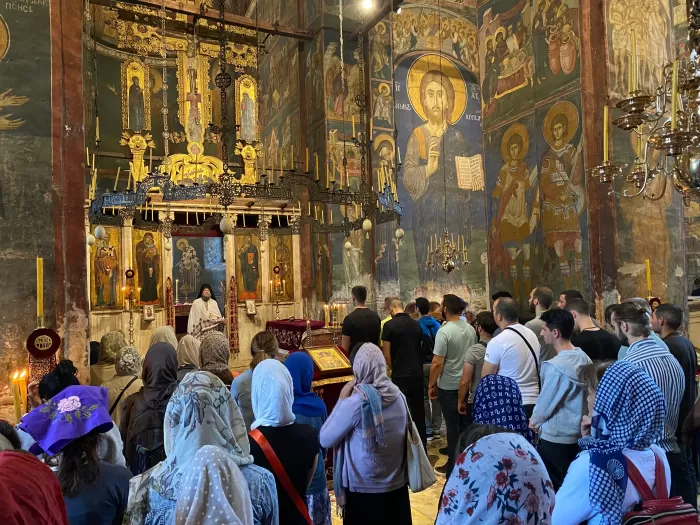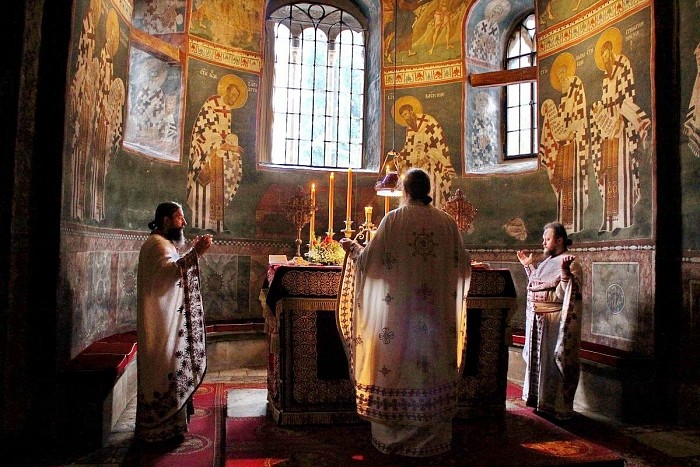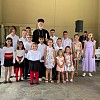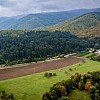Kosovo's Minister of Culture Mr. Hajrulla Çeku (LVV) claims in his most recent media statement that Visoki Dečani Serbian Orthodox Monastery does not need the KFOR 24/7 protection any longer and that it is not endangered (source) However, the protection of the Monastery by KFOR is needed more than ever amid rising ethnic and political tensions as well as openly discriminatory behavior of Kosovo authorities.
Kosovo's Minister of Culture Mr. Hajrulla Çeku (LVV) claims in his most recent media statement that Visoki Dečani Serbian Orthodox Monastery does not need the KFOR 24/7 protection any longer and that it is not endangered (source) However, the protection of the Monastery by KFOR is needed more than ever amid rising ethnic and political tensions as well as openly discriminatory behavior of Kosovo authorities, Dečani monks claim.
After four armed attacks by Kosovo Albanian extremists (two mortar attacks in 2000, one mortar attack in 2004 and an RPG grenade attack in 2007), which happened despite the presence of KFOR, with the aim of destroying the Monastery and injuring those who live in it Dečani Monastery is the most frequently attacked Serbian Orthodox Church (SOC) holy site in Kosovo. Only the third attack was investigated by police but the court characterized an RPG attack as a disturbance of peace and order and let the perpetrator (a local Kosovo Albanian male) with a minor sentence. The tensions did not subside after that. After two series of the ISIS and the KLA graffiti on the Monastery walls (2013, 2014) and the arrest of an armed Kosovo Albanian group associated with ISIS in front of the Monastery gate in January 2016 Dečani Monastery, as the symbol of Serbian Orthodox tradition in Kosovo, still remains one of the prime targets for Kosovo Albanian political and religious extremists. Although it is respected by many ordinary citizens it is a thorn in the eyes of those who claim that Kosovo has always been only ethnic Albanian land. There is no need to go much in history as Dečani Monatery is one of the best historically documented sites in the Balkans with many international historians and travellers, documents, Medieval charters, Ottoman documents etc. testifying its rich history. After all this seven centuries old Monastery built by Serbian King Stefan Uroš III and his son Stefan Uroš IV in the 14th century is the one of the most important medieval Christian sites in the Balkans and the Monastery with uninterrupted monastic tradition of 700 years.
Regrettably, despite of all previous armed attacks which in some other countries could legally be called terrorist attacks and the historical importance of the Monastery, Kosovo Government continues to ignore its own laws and court decisions related to the Monastery despite the insistence of the EU Parliament and Western ambassadors in Priština, academics and many diplomats to do so. For six years Kosovo Government and the Dečani Municipality refuse to inscribe the Monastery 24 hectars of land confirmed by Kosovo Constitution Court after 16 years long litigation. The Kosovo Constitutional Court has in the meantime ordered the initiation of criminal proceedings for obstruction of the law due to the non-implementation of the Constitutional court decision. Surprisingly Kosovo authorities who pledge full allegiance to European future refuse blatantly decision of their own Constitutional Court for no valid reason whatsoever. Having in mind the inadequate level of the rule of law in Kosovo the legal proceedings against the obstruction of the Court ruling implementation might be another way of evading the recognizing of the Monastery land and prolonging ad infinitum the status quo which endangers the Monastery and damages Kosovo's image. Here it is clear that it is not the Monastery or internationals to be blamed but those who lead Kosovo institutions and ignore the rule of law. But in Kosovo media the Monastery is identified as a main problem which additionally creates tensions and endangers the Monastery security. Targeting the Monastery and its monks is a dangerous game in which Kosovo can only lose in the international eyes.
Another problem is non-construction of a bypass transit road around the monastery zone , because the law on Special protective zones SPZ explicitly prohibits transit roads in the green zone of the Monastery. The logic is clear, an oasis of green peace and Medieval heritage can be seriously endangered by heavy traffic of trucks transporting timber from the mountains as well as from Montenegro where the road is intended to go. The decision which resolved this years long issue was finally signed in November 2020 by the heads of EU, OSCE, KFOR missions, two Kosovo ministers (of Spatial Planning and Culture), SOC representatives and the mayor of Dečani at the meeting of the SPZ Implementation Monitoring Council (IMC) agreed with the Italian Government facilitated arrangement which was satisfactory to all but which insisted that beside rehabilitation of local roads for light traffic and tourism a bypass road must be parallely constructed for the heavy traffic. KFOR was tasked to report on the progress of the arrangement which consists of several parallel milestones. Now the Dečani mayor Mr. Bashkim Ramosaj (AAK) claims in his meetings with international diplomats that the Government is responsible of not fulfilling these obligations, and the Government does not give an answer why they ignore the IMC decision on the road. The strategy of evading the responsibility is taken in regards to the Constitutional Court decision too. Dečani Mayor claims that it is the job of the Government and the Central Cadastre and the Government is evading any answer and wants to re-discuss the already closed and legaly biding Court decision. In fact the Municipal Cadastre is obliged to inscribe the land according to the legal opinions of experts and it resolutely refuses to do so.
In the road issue it is legitimate that the local Municipality needs a route for transporting the timber from the mountains and connecting to Montenegro and the only possible legal solution is an agreed bypass road. According to the EU and OSCE legal teams' opinions a transit road for heavy tracks cannot pass next to the 14th century Monastery which is one of 4 UNESCO World heritage sites in the territory of Kosovo. This kind of road is strictly prohibited even if the Monastery itself agreed. So there is nothing to agree with the monastery but to respect the law which was approved by Kosovo Parliament. Discussion about the road issue in 2020 and previous years was more an exchange of opinions and consultations with internationals how to understand the law and what is at stake. The Monastery is not against developing of roads but transit road in Special protective zone are a prohibited activity and there is no way around and no dialog on this issue which was eventually adopted by all sides in November 2020.
One of the arguments for the idea that KFOR should leave Dečani Monastery to Kosovo police is that a number of other SOC sites are protected in that way. But situation in Dečani region is starkly different. Almost 80% of the SOC problems are focused on Dečani Monastery. A few years ago the Mayor ordered children from the school and many citizens to protest against the Court decision. The road to the Monastery remained blocked for some time. KFOR increased its protection. So far many incidents against the Serbian Orthodox Church sites in Kosovo have not been investigated by the Kosovo police at all and the incident with the arrest of the armed group in front of Dečani Monastery in 2016 has never been investigated by Kosovo police although the Embassies found out that the names of the arrested were linked to a pro ISIS group. Investigation of what the armed group was planing was done only by KFOR military intelligence teams but not Kosovo police. The reason was that the incident was an embarrasment in the time when Kosovo was one of the top territories in Europe who had jihad warriors in Syria and this incident was quickly hidden under the carpet. No need to say that Kosovo police in many parts of Kosovo is still under the firm influence of the local clans and is not trusted by non-Albanian population. Western part of Kosovo is with the exception of KFOR which is not allowed to meddle in criminal affairs of the local clans without any significant international supervision. EULEX in this part of Kosovo has not even an office and the teams of this highly expensive EU funded organization focus primarily on North Kosovo while the Western Kosovo flourishes beyond the international radar. All this is well known in the reports of the intelligence community of the EU countries as some previously accidentally leaked documents clearly indicate. One cannot understand the risks around Dečani Monastery without this wider context.
Also, KFOR protection of Dečani Monastery is needed due to the general political, legal and security instability for the Serbian people in Kosovo, as the Kosovo authorities behave for 23 years as if this is a purely ethnic Albanian territory and prevent in many ways the return of exiled Serbs. After the war at least 150.000 Serbs were forced to leave Kosovo and around 1000 are still missing. Unlike Bosnia and Herzegovina where the return rating of the refugees is much better despite the more complex conflict Kosovo is an example of a failed mission in this respect. The return of the Serb property confisated by local Albanians is almost impossible. Those few ones among Serb returnees who get justice in courts are often arbitrarily dozen of years later proclaimed war criminals and forced to leave Kosovo at the end. As Fr. Sava often repeated "Serbs are guilty until they prove they are innocent but everywhere in the world any person is innocent until proved to be guilty". The narrative of the collective Serbian guilt is a handy tool for the large scale theft of the Serbian owned property and all this is going in front of international eyes. Kosovo leaders now try to impose collective guilt over the Serbian people. The truth is that the entire Yugoslav-Serbian leadership of the 1999 time was brought to the court and many sentenced. On the other hand no major KLA leader has been legally sentenced although there are so many proves of crimes against other Albanians, Roma and particularly Serbs. KLA flags fly in Kosovo today as one of the official flags. An organization which was disbanded by the UN Mission after the war has de facto resurged and is being propagated as one of the main images of Kosovo. This is automatically dividing the population in Kosovo and creates a deep mistrust. No wonder that so many young people want to leave Kosovo which cannot find way from its past to its future by adopting an inclusive approach to all its citizens.
Western countries which recognized Kosovo‘s proclamation of independence did so on the basis of the Kosovo’s commitments to treat all citizens equally in a "country of citizens" as Kosovo is envisaged and proclaimed in the Constitution. But this cannot be seen in every day life 14 years after the Independence Proclamation. That is why many countries (among them five EU states) do not recognize Kosovo’s independence and wait for the conclusion of the EU facilitated dialogue between Belgrade and Priština on normalization of relations. Visoki Dečani Monastery and the Serbian Orthodox Church despite years of constructive engagement in dialogue with the local Kosovo Albanian institutions and helping local Kosovo Albanian refugees during the 1999 war are constantly exposed to the blatant denial of the Serbian Orthodox identity, religious rights, along with constant media hate speech and open slanders by nationalist Kosovo Albanian individuals and groups. Although the war-time and post-war time role of the Monastery was recognized during the 2009 US President Biden visit to the Monastery (then the US Vice President) Dečani monks are being often presented in Kosovo public in the negative light. The Church and her pilgrims are not allowed even to access some of its properties and sites (Priština, Suva Reka, Djakovica which is constantly highlighted in the US State Department Religious Freedom reports) while a number of 150 churches destroyed by extremists after the 1999 war remain in ruins despite reconstruction of two dozens of them thanks to the Council of Europe led Commitee.
The ethnic and religious discrimination campaign against the Serbian Orthodox Church has been going on for the last 23 years as the Church is misleadingly presented by Kosovo Albanian nationalists-cum-mafiosi as the main obstacle to Kosovo without Serb presence, as an ethnic pure Albanian territory where all Serb historical traces would be deleted or proclaimed ethnic Albanian. The Monasteries as long as owned by the SOC are a problem to claim that Kosovo is just ethnic Albanian land because every stone of Dečani, Patriarchate, Gračanica, every fresco, every book and medieval document say a different story which is not anti-Albanian but makes it clear who created this heritage. The paradox is that Kosovo with such a position of ethnic exclusivity and intolerance discourages many in the West to see it as a society compatible with Western democratic values but very few Kosovo Albanians can see it that way. Therefore without the protection by KFOR, Dečani monastery would hardly be able to normally live if survive at all. It would have been forced to radically limit the visit of unknown persons and visitors and install additional barbed wire, ICTV cameras on the walls as well as around its land. All this was communicated to the highest representatives of the NATO alliance. So reasonable people see that this is not a way out. Kosovo must change and accept all citizens and traditions regardless of their background.
Regrettably relations between the SOC and the Kosovo Ministry of culture are in a steady decline. The current Minister is seen as a deeply divisive person and has recently been criticized for a project which the German Ambassador in Kosovo equalled to history whitewashing. A reconstruction by the Ministry of the house of a notorious Kosovo Albanian Nazi collaborator and persecutor of Jews and Serbs in WWII was a pretext to change the history narrative and de facto rehabilitate a person who left a bloody stain in history. With such a gaffe Minister Çeku has lost all confidence not only by the SOC and Kosovo Serbs but all who don’t want neo-Nazi revivalism in Kosovo.
The Serbian Orthodox Church in Kosovo which respects the local laws remains determined to preserve its identity, tradition, property rights and religious freedom by all legal means as it is a basis of every democratic society. As long as the Church feels threatened in Kosovo (the endangered status of Dečani Monastery is recognized by the reports of UNESCO 2005, Europa Nostra 2021, OSCE, US State Department reports on religious freedom and other international organizations), the Monastery needs special institutional protection as well as security presence of KFOR. KFOR is also an important guarantee that no violence may be used by anyone for political purposes. It's mission is both stabilization and deterrent mission with the goal to help all in Kosovo find their future in a democratic society. With the sad epizode of the 2004 riots KFOR has since then invested lots of authority in this mission and any failure may be detrimental for the global interests of NATO and Western countries. In Western Kosovo which is called by Serbs Metohija Italian KFOR has done a tremendously good job helping even return of some expelled Serbs, protecting most important sites and winning confidence of Serbs and Albanians and all other peoples alike. This will definitely be remembered in history.
The issue of the long-term protection of the Serbian Orthodox Church heritage in Kosovo, beside the law provisions based on the Ahtisaari plan Annex 5, should be therefore established on the basis of additional international guarantees in the context of the dialogue between Belgrade and Prština in order to prevent abuses in the future. The Kosovo laws themselves proved to be inadequate per se as the Kosovo authorities don't respect them themselves and the Church needs an umbrella agreement guaranteed by the international community and accepted by both Belgrade and Priština as a condition for the Western support in the European future of the Western Balkans. This is not a politization of culture but de-politization as in the case that Kosovo forcefully takes over SOC sites in Kosovo and forces the clergy out and changes the identity and history of these churches that would be a major political problem and a precedent for many other countries and societies. No need to say that Serbia and many countries in the world will never accept it. Definitely such Kosovo would remain a pariah territory forever and it is not in anyone's interest, particularly not younger Kosovo Albanians who need perspective in their lives as young Serbs, Bosniaks, Gorani, Roma etc in Kosovo. So the Serbian Orthodox Church always stood firmly on the position that its legal status in Kosovo must be fully safeguarded both locally and internationally using as examples some models existing in the EU. In the UN Resolution 1244 in 1999 protection of the Serbian Patrimony is clearly mentioned. Ahtisaari plan produced an Annex on protection of the SOC heritage and the SOC with its administrative center in Belgrade (nothing strange as the administrative center of the Catholic Church is in Vatican). The Church cannot offer a formula for a political solution in Kosovo but it has full legitimacy to request the protection of its religious rights, property, freedoms, its name and identity. After all we are in Europe of the 21st century.
As it is clear that Kosovo is still far away from a society of fully equal citizens but may remain for a long time a society based on a fragile equilibrium between the Kosovo Albanian and other communities, the special status for the SOC sites and the Serbian community are necessary regardless of the final outcome of the Brussels facilitated dialog. Although many Kosovo Albanians will quickly say that the SOC churches are in fact Albanian churches occupied by Serbs, the world historians and educated people in the West cannot be easily misled. History is based on written facts and artifacts and not on wishful thinking and superficial mythology. There is so much literature which says clearly who built the churches and who uses them and has taken care of them for centuries. After all, religious sites are the shared cultural heritage of all but have their immediate owner and user. The final argument against this preposterous claim which regrettably found its way to Kosovo mainstream media and even schools is the most compelling. Why would Kosovo Albanian nationalists so much attack Serbian Orthodox Churchs (150 of them, many medieval ones) especially after 1999. Most of those sites were burned or heavily damaged. If they considered them Kosovo Albanian churches why they would attack their own heritage. In Prizren in 2004 riots Kosovo Albanian rioters burned all medieval churches in one evening. They were Serbian Orthodox churches which were the pride of all citizens of Prizren regardless of their ethnicity or religion. So far no plausible answer to this question can be heard. The way out of this game of false arguments and propaganda is a peaceful life of all ethnic and religious communities in the rule of law which would protect all citizens and their identities. When there is such an achievement some more permanent settlements may be expected but it is up to the political representatives to decide. The Church is here and will remain here serving all who come to them and welcoming all people of good will.
For everything to work well once something is agreed it is important also to have a functional implementation mechanism in case that one of the sides does not abide to what is at some stage agreed. As the comprehensive agreement between Belgrade and Pristina is still uncertain, Serbian Orthodox Church heritage in Kosovo remains dangerously vulnerable especially as the Kosovo Government ignores its laws and wants to coerce Serbs into full submission by threats and pressures. Draft laws on religious freedom and cultural heritage which were supposed to be adopted by the Kosovo Parliament on the basis of the Ahtisaari principles are in a limbo. Some high-level Kosovo officials even don’t want to call Serbian Orthodox Church by its official name although it is recognized as such in the Kosovo constitution, some even wanted as in 2015 draft of the law on Cultural Heritage to confiscate all SOC heritage as a "property of Kosovo state" which provoked a vehement opposition of the Church to the Kosovo's bid to UNESCO. Confiscation of religious property is a model equal to Communist regime of Enver Hoxha in Albania and such authoritarian ideas must be forgotten. In Dečani municipality today many visitors cannot find the road to the monastery because the municipal authorities persistently refuse to place proper signs in two officiall languages (Albanian and Serbian, preferably in English too) in the town center showing the way towards this UNESCO site. Currently only one adequate sign stands just next to the KFOR checkpoint just next to the Monastery as the soldeirs prevent its removal. According to Google maps unknown hackers have removed De;ani Monastery several times from Google maps. This all makes it clear that local authorities don’t want to use this valuable UNESCO world heritage site as an asset for bringing more tourists and are essentially damaging the development of the municipality and Kosovo as a society in general. Due to KLA flags and statues of KLA fighters with Kalashnikovs no international tourists stop in Dechani town for a cup of coffee unlike Prizren or Peć/Peja which are more tourist friendly. Accusing the monastery for alleged preventing development of tourism in Dečani area is a ridiculous statement as most of the foreign tourists if not all come exactly to see the Monastery and not to roam the city streets. True, the Dečani region is rich in nature and can offer a lot and the Monastery has always been ready if it is fairly treated to help the Municipality in development of green and ecologically accpetable forms of tourism outside of the Special protective zone. But with a prolonged "war" with the Monastery the Municipality and Kosovo Government as it is behaving now is shooting in its legs.
Serbian Orthodox Bishop Teodosije, as a previous abbot of Dečani, and the current Dečani Abbot Fr. Sava have spoken about all these issues several times both publicly and in contact with international and local representatives. However in the atmosphere of the endemic lack of the rule of law and order, the absence of inclusive position of the Kosovo Government towards all ethnic and religious communities and the general atmosphere of impunity it is not very likely that an efficient model of protection of the vulnerable Serbian Orthodox heritage can be found. That is an additional reason why KFOR presence around the most vulnerable Monastery in Kosovo and the only one with 24/7 military protection in the European continent should continue in order to prevent the aggravation of the already unsatisfactory political and security situation in the region. Some say that wining in peace is more difficult than winning in war. In Kosovo's case, it is definitely a truth which must not be ignored.
Author: JD
The article is based on the recent statement by Dečani Monastery brotherhood and other SOC sources and is not a Diocesan Communiqué.
|
| |||||||||||
